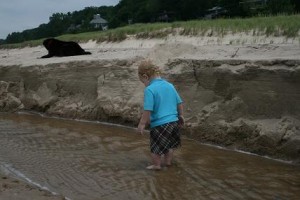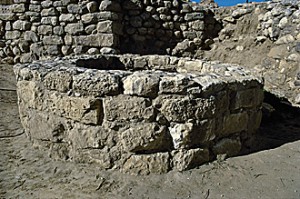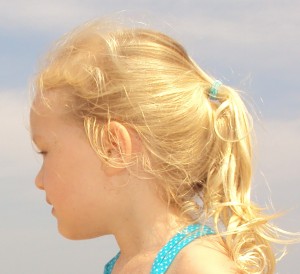Skylar and Micah love the beach, as most children do. We’ve tried to spend lots of time there where everyone is busy, happy and gradually gets worn out toward a good night’s sleep.
The other day after a wild thunderstorm, our normally south-veering creek had swelled with enough rainwater to overflow its banks and had cut a new route, emptying into Lake Michigan toward the north. The kids loved playing in the gently moving, shallow water, and I saw an interesting phenomenon.
As the creek steadily ran across a new area of the beach, it gradually carved a deep course, cutting through 3 feet of sand. Never mind its gentle flow. Slow and relentless had done the job. Little by little individual grains of sand coaxed into the water had washed out into the lake. When enough sand had been moved, the sides collapsed in slow motion, widening the creek and its influence on the beach.
While watching 18 month old Micah with one eye and the creek bank with the other, I felt God nudging me toward a lesson:
small effort + steadfastness = impressive results
If I was told to move one grain of sand, it’d be easy, but digging a yard-deep trench would take more muscle than I could give.
The lesson is one most of us need to relearn throughout life. Applied to dieting, for example, it might mean eliminating one treat per day and losing pounds slowly but continually until we finally arrived at an ideal weight. Instead we go-for-broke, eating next-to-nothing or only broccoli because slow-and-steady takes too long. And of course radical diets never work.
Or let’s say we have trouble saving money. Setting aside 1 dollar each day would find us with $365 at the end of the first year. But we’d rather slash and stash a big amount overnight, even though we know we’ll have to use it by the end of the month.
Another example might be prayer. Talking to God for just 1 minute a day would mean by the end of the year we would have prayed over 6 hours, an investment of incalculable value to those for whom we’d prayed.
Q: What prevents us from rolling away one grain of sand at a time?
A: Thinking big and thinking speed.
None of us wants to spend time doing something small and unimportant. Moving 1 grain, losing 1 pound, saving 1 dollar or praying 1 minute seem like investments too small to be of any value. No one would even notice.
But that’s inaccurate. God would.
And more than just noticing, he’d be pleased with our:
- quiet contentment in small beginnings,
- demonstration of long-term commitment,
- perseverance.
He’d also reward us with eventual impressive results. Moving that 1st grain of sand followed by the 2nd, 3rd and 4th would be a painless way to win God’s approval while accomplishing something significant.
Who knew a wayward creek could teach us how to grow in godliness.
“Godliness with contentment is great gain.” (1 Timothy 6:6)




